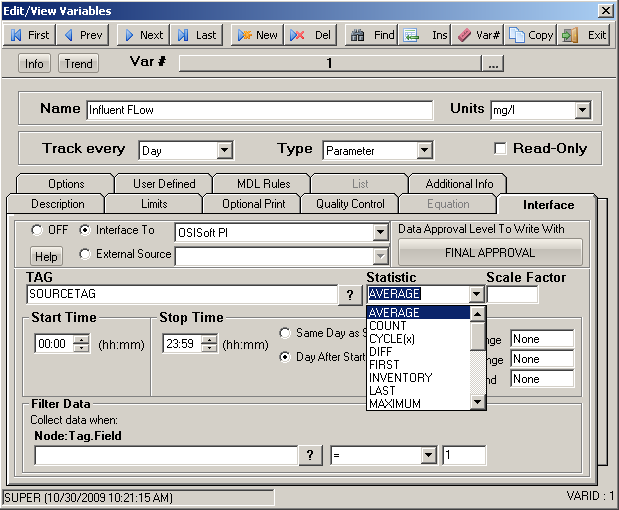The Hach WIMS Direct Server-Side Interface to OSISoft PI Historian has the capability to import data with two methodologies: interpolated and non-interpolated. The setting is described in Configuration - Source Configuration Q12233 - Advanced Settings.
This setting works fine when all source data needs to be imported with one specific method. What happens when one variable needs the opposite method? Simply add a suffix to the statistic as explained below, and this can be achieved.
In the Hach WIMS Client program, select System Setup > Edit/View Variables and go to the variable to be changed. Select the Interface tab and select the base Statistic desired as shown below:

Now for an example; our interface is set up to import non-interpolated data, but we need the interpolated average for Influent Flow. After selecting AVERAGE, enter '.I' (dot and the letter I) at the end of AVERAGE so you have:

The two options here are:
- .I - for interpolated (dot and the letter I)
- .R - for non-interpolated or raw data (dot and the letter R)
This works on all statistics but some are not affected. The statistics affected by this setting are: Average, Minimum, Maximum, Total, First, Last, DIFF, and Range. The statistics not affected by this setting are; Inventory, statistics that count number of data points (Count, Cycle, Time(x), etc.), and text parameters. One exception to this rule is when a SCADA tag is filtered by another tag using Filter Data (see screen above, bottom of display). If the variable uses Filter Data, the method will always be interpolated. The reason for this is that the data retrieved from both tags must match by date and time in order to make the comparison. The interpolated method will ensure all data is spread over equal time intervals to ensure source data for both tags have matching date and time.
Also, previous versions of this interface supported FIRSTCOMP, LASTCOMP, and MOSTCOMP. These will work and mean non-interpolated results (the same as specifying FIRST.R, LAST.R, and MOST.R).
As of version 8.0.4 support for interpolated data was added to the TIME statistics. The statistic needs to be entered like: TIMEGT(x).I. The piinterp2 table will be used and a timestep will be added to the query.
The other fields on this form are described in Supported variable configurations for interface Q12233.